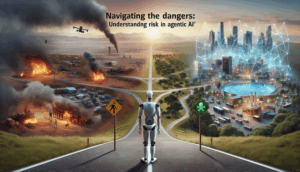Introduction to AI Agents and Their Significance
AI agents are reshaping industries around the globe in 2025, enhancing business operations and driving significant change. These intelligent systems streamline processes, augment productivity, and enable companies to make data-driven decisions faster than ever before. For instance, AI is instrumental in optimizing supply chain management, where businesses leverage its capabilities to achieve 40-50% reductions in operational incidents, as seen in sectors like agriculture and food distribution [Source: Diginomica].
Furthermore, AI agents are not just limited to automation; they also play a crucial role in advanced analytics and customer engagement. Companies such as IBM and Microsoft are integrating AI into tools like Dynamics 365 and Microsoft 365 Copilot, transforming them into powerful engines for automating everything from customer service to financial processes [Source: Mashable].
Recognized through prestigious awards, such as the AI Impact Awards, organizations are increasingly adopting AI to solve pressing global challenges and enhance their operations [Source: Newsweek]. As AI agents become more embedded in business practices, their ability to drive efficiency and innovation continues to grow, signifying a profound shift in how industries operate and engage with their environments. For a deeper dive into how AI agents are revolutionizing tasks across various sectors, check out our article on the transformation of industries through AI solutions here.
Top Free AI Agent Tools Revolutionizing Your Workflow
In 2025, a range of free AI agent tools are transforming workplace productivity. Notably, OpenAI and Microsoft are at the forefront with innovative solutions that don’t require hefty investments.
- OpenAI’s GPT Tools: OpenAI continues to lead the pack with its GPT-based offerings, which serve as powerful AI agents capable of handling various tasks from content generation to data analysis. These tools are integrated into numerous applications, enabling seamless automation of workflows.
- Microsoft 365 Copilot: This AI-driven assistant is built into Microsoft 365 applications, helping users enhance productivity by automating mundane tasks like email drafting and report generation. It’s designed to streamline operations across platforms like Word, Excel, and Outlook, allowing users to focus more on strategic decisions rather than routine work. More on this can be found [here].
- Dynamics 365: Furthering Microsoft’s contribution, Dynamics 365 combines AI with customer relationship management (CRM) and enterprise resource planning (ERP), providing businesses with intelligent insights to drive better customer engagement and operational efficiency.
- Azure AI Agent Service: This service extends AI capabilities across the Azure platform, automating tasks from customer support to data processing in real-time, thus significantly enhancing productivity at a lower cost.
- xAI’s Grok Studio: A game changer introduced in 2025, Grok Studio allows users to collaborate on documents and code with AI support and features advanced spreadsheet editing. This positions xAI as a competitor in the productivity tools space, integrating AI directly into workflows for enhanced collaboration. Discover more about Grok Studio here.
These tools are not just about automation; they are part of a growing trend that sees AI deeply embedded into everyday tasks, ensuring businesses leverage technology effectively without straining their budgets. For a deeper exploration of AI’s role in workflows, visit our article on how AI agents save time.
Feature Spotlight: What Makes an AI Agent Stand Out?
The effectiveness of AI agents hinges on several key features that enhance automation, streamline integration, and boost user-friendliness.
- Automation Capabilities
AI agents excel in automating repetitive tasks, increasing productivity while reducing human error. For instance, platforms like Microsoft 365 Copilot and IBM’s Watson provide tools that automate customer service tasks, financial reconciliation, and HR functions. By leveraging advanced machine learning models, AI agents can handle complex workflows, allowing human workers to focus on higher-value activities [Source: Mashable]. - Integration with Existing Systems
Seamless integration with existing software is crucial for AI agents to function effectively. Tools such as Salesforce’s Agentforce offer an open ecosystem that allows businesses to operationalize AI at scale [Source: Mi3]. This integration capability ensures that AI agents can interact with various applications and data sources, enhancing their utility across different organizational contexts. - User-Friendliness
The success of AI agents is largely determined by their ease of use. A user-friendly interface encourages greater adoption and efficiency among users. This aspect is particularly important as studies have shown that AI agents can enhance both individual productivity and collaborative efforts by simplifying complex processes and providing intuitive interaction options [Source: Bloomberg Law].
In summary, the standout features of AI agents—automation, integration, and user-friendliness—collectively contribute to their rising prominence in various industries, enabling organizations to optimize operations and enhance overall efficiency. For further insights on AI agents and their transformative roles, explore resources on agentic AI and the AI agent tech stack.
Success Stories: Companies Leveraging AI Agents for Growth
Numerous companies are harnessing the power of AI agents to transform their operations and achieve significant growth. Here are some standout examples.
- Samsara
Samsara is revolutionizing industries like agriculture, food distribution, and chemical logistics by digitizing traditionally paper-based operations. Their AI-powered safety systems have led to remarkable outcomes, including a 40-50% reduction in incident rates. By incorporating predictive analytics and asset tracking, Samsara helps clients not only ensure safety but also streamline their overall processes, enabling them to embrace modern digital practices [Source: Diginomica]. - Klarna
Klarna, a leading payment service provider, employs an AI shopping assistant powered by OpenAI, efficiently performing the work of around 700 full-time agents. This not only improves customer engagement but also optimizes the payment process across various platforms. By augmenting its workforce with synthetic intelligence, Klarna exemplifies how AI can enhance user experience and operational capabilities in e-commerce [Source: The Drum]. - Healthcare Innovations
In the healthcare sector, AI agents are evolving from simple diagnostic tools to comprehensive autonomous systems. These agents can schedule appointments, manage medical records, and even monitor patients, reducing the administrative burden on healthcare professionals. Systems enhanced by AI agents effectively streamline patient care processes, ensuring timely communication and accurate data management without continuous human intervention [Source: Forbes].
These case studies highlight the transformative impact of AI agents across various industries, showcasing their role in enhancing efficiency, accuracy, and ultimately, corporate growth. For more insights, explore our articles on how AI agents are transforming tasks and industries and the technology powering these digital teammates.
Looking Ahead: The Future of AI Agents Beyond 2025
As we gaze into the horizon of AI agents beyond 2025, the landscape is set to transform with emerging trends and technologies that promise to reshape market dynamics and user experiences. Key players in the industry, such as OpenAI and IBM, are already integrating these agents into their offerings, with tools like Microsoft 365 Copilot leading the charge in automating various tasks ranging from customer service to HR support. The proliferation of AI agents across sectors is expected to streamline operations and enhance productivity—a reality evident in organizations deploying autonomous solutions to tackle daily challenges more efficiently [Source: Mashable].
However, amidst this optimism, experts warn that up to 40% of AI agent projects may fail by 2027 due to rising costs and unclear business value. Organizations must navigate these challenges carefully, ensuring that deployment strategies are both innovative and practical. Gartner’s analysis points out that the journey towards widespread adoption will be fraught with misapplications and risks [Source: Forbes].
The integration of AI agents also brings a heightened focus on security, as these systems represent a new frontier of cyber risk. Companies will need to collaborate closely with IT and security teams to safeguard their AI workforce from threats like data poisoning and unauthorized access [Source: Technology Decisions].
Investment trends suggest a cautious optimism, with about 19% of organizations making significant investments in agentic AI, while a larger proportion remain hesitant or indecisive [Source: RCR Wireless]. As AI agents continue to evolve, staying informed about these developments will be crucial for businesses looking to harness their full potential while mitigating inherent risks. For those keen to gain a deeper understanding of agentic AI and its implications, consider reading our articles on the rise of agentic AI and exploring how to build your first AI agent without coding here. Stay prepared for what lies ahead!
Sources
- Diginomica – How Samsara Helping Agriculture, Food Distribution and Chemical Companies Digitize
- Forbes – The Amazing Ways AI Agents Will Transform Healthcare
- Forbes – AI Agents and Hype: 40% of AI Agent Projects Will Be Canceled by 2027
- Mi3 – Salesforce Unveils Agentforce 3 to Enhance AI and Human Workforce Integration
- Mashable – 7 AI Agents Widely Used by Companies Right Now
- Newsweek – AI Impact Awards 2025 Science & Engineering
- RCR Wireless – Agentic AI: Gartner
- Technology Decisions – AI Agents Securing the Artificial Workforce
- The Drum – How Brands Are Moving Beyond the Real Weird with Synthetic Humans
“`



